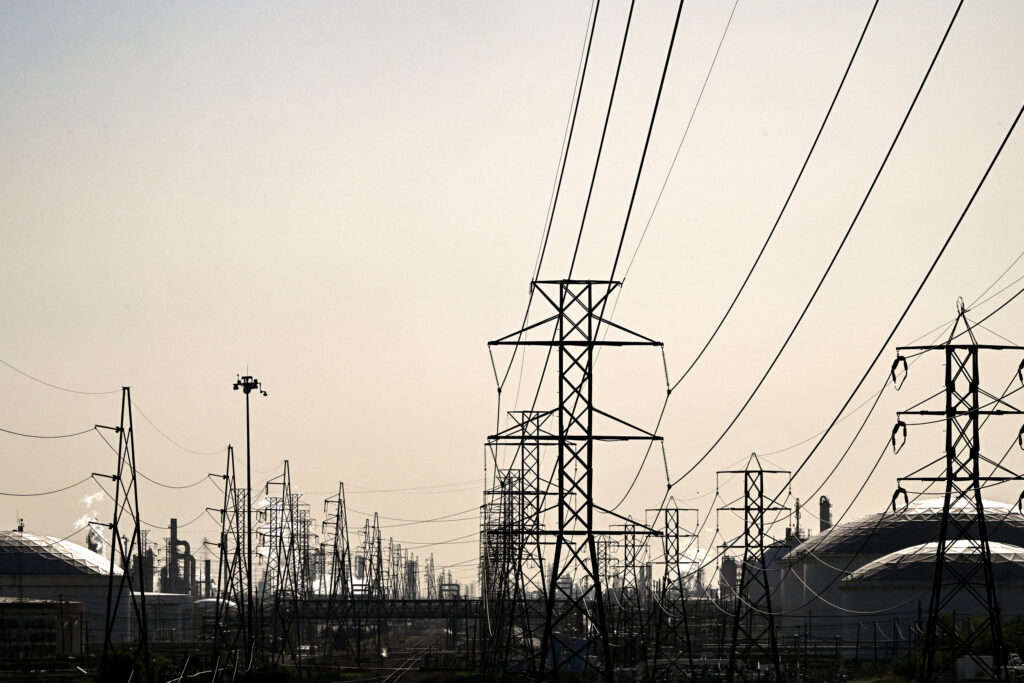Companies plan to build more than 100 new gas-fired power plants in Texas in the next few years amid a race to meet enormous electrical demand from energy-hungry industries, according to a report released Wednesday by the Environmental Integrity Project, a Washington D.C.-based nonprofit.
The projects would amount to 58,000 megawatts of new generation capacity, enough to power more than 8 million average American households, although many likely won’t move past the planning stage. The report said proposed plants in Texas aim to support data centers for artificial intelligence and other heavy industries. They would also add an estimated 115 million metric tons of greenhouse gases every year to the atmosphere–as much as nearly 27 million more gasoline-powered cars on the road.
“Building more natural gas infrastructure and power plants would saddle Texas’ growing population with more health-harming pollution and contribute to planet-warming greenhouse gases,” according to the 24-page report written by research analyst Griffin Bird.
The research reviewed permit applications, government data, public announcements and records from Texas’ grid operator to tally 108 proposed new gas plants and 17 expansions. That includes four projects currently under construction, 33 that have received permits but haven’t broken ground and 98 that are proposed. More than 60 projects aim for completion by the end of 2028.
The rapid buildout mirrors a global trend and comes as Texas authorities expect statewide power demand to nearly double by 2030, driven largely by a proliferation of advanced computing facilities.
“The sheer volume of additional gas projects quickly popping up in Texas that EIP have been flagging through air permit applications is indeed astonishing,” said Jenny Martos, manager of the oil and gas plant tracker at Global Energy Monitor, a California-based nonprofit.
Martos said gas power expansion globally is largely seen in Asian countries. In the U.S., Texas leads all other states in existing gas power generation and planned gas power generation, as well as production of oil and gas. It is also a leader in renewable energy.
Still, Martos said the gas projects face “headwinds” and uncertainties. Among them: the use and possible regulations of artificial intelligence technology and the massive speculative energy demands related to AI’s evolution.

A year ago, the Biden Administration was urging 100 percent renewable energy in the United States by 2035. Now, the AI boom has upended all calculations. Energy projects face supply delays and prices have surged for gas-fired turbines, essential for production.
“Manufacturers were caught flat-footed,” said Daniel Cohan, a professor of civil and environmental engineering at Rice University in Houston. “The cost of the gas turbines is now more than the cost of wind and solar farms, even before considering that you have to pay for the fuel.”
Authorities in Texas have taken steps to support natural gas as the predominant power source, even after years of steep growth in the state’s wind and solar power generation. During legislative sessions in 2023 and 2025, lawmakers provided a total $10 billion in public financing of low-cost loans for new gas plants. No such taxpayer funds were designated to encourage wind or solar farms.
Projections of data center growth and energy consumption have led to optimistic expectations for Texas gas producers.
Residents who live near planned gas plants are less enthusiastic. In the tiny town of Blue in Lee County, neighbors are fighting plans for a massive power plant that would primarily serve private, commercial customers many miles away. They are worried about air, noise and light pollution and their quality of life.
“If you’re going to build a bunch of gas plants, don’t plop them down in the middle of nice, quiet, peaceful communities like ours,” said Travis Brown, a former state department of agriculture worker and spokesman for a group called Move the Gas Plant. “Preserving what’s left of rural Texas should be a priority. That’s an important part of our culture and our heritage.”


Report Alleges Improper Emission Permitting
While natural gas burns much cleaner than coal, it still creates soot and emissions including greenhouse gases that warm the planet, nitrogen oxides that contribute to ozone formation, and known human carcinogens like benzene and formaldehyde.
The Environmental Integrity Project report found, in some cases, Texas allowed developers of large gas power plants to circumvent big parts of the permit process for major pollution sources. Companies underrepresented prospective emissions in their applications and then sought “standard” permits meant for smaller facilities rather than new “major source” permits, the EIP report found. Major source permitting requires more time for public notice and comment and companies must commit to the best available emissions control technology.
This story is funded by readers like you.
Our nonprofit newsroom provides award-winning climate coverage free of charge and advertising. We rely on donations from readers like you to keep going. Please donate now to support our work.
Donate Now
One example cited by EIP: EmberGreen and EmberYork, related companies that received permits for two 900 MW gas plants in the towns of Sealy and Wharton.
The permit applications represented the facilities’ emissions as below the thresholds of major pollution sources for carbon monoxide, nitrogen oxides and formaldehyde when assuming 3,900 hours of operation, or about 162 days, per year. However, EIP wrote, the facilities’ permits contained no requirement to limit operations to 3,900 hours per year, or to report operating hours.
Likewise, a 930 MW gas plant by ENGIE in Robstown received permits as a minor source assuming 2,000 hours of annual operation. But its permit also included no limitations of operating hours.
The state’s environmental regulator, the Texas Commission on Environmental Quality (TCEQ), has routinely enabled industrial developers to avoid the requirements of major source pollution review by issuing smaller permits, according to a 2023 investigation by Inside Climate News and the Texas Tribune.
The TCEQ did not respond to queries from Inside Climate News about the new report, nor did EmberClear or ENGIE.
Patton Dycus, EIP’s senior attorney, said federal law requires emissions sources to be evaluated based on their full capacity to emit unless they are specifically limited in permits. In April, Dycus wrote the federal Environmental Protection Agency urging a review of Texas’s permitting of the new gas plants.
“If new gas-fired plants that are major sources of criteria pollutants are constructed without the required Clean Air Act construction permits, that construction would be unlawful,” the letter said. “TCEQ must not permit future similar gas-fired power plants through standard permitting.”
About This Story
Perhaps you noticed: This story, like all the news we publish, is free to read. That’s because Inside Climate News is a 501c3 nonprofit organization. We do not charge a subscription fee, lock our news behind a paywall, or clutter our website with ads. We make our news on climate and the environment freely available to you and anyone who wants it.
That’s not all. We also share our news for free with scores of other media organizations around the country. Many of them can’t afford to do environmental journalism of their own. We’ve built bureaus from coast to coast to report local stories, collaborate with local newsrooms and co-publish articles so that this vital work is shared as widely as possible.
Two of us launched ICN in 2007. Six years later we earned a Pulitzer Prize for National Reporting, and now we run the oldest and largest dedicated climate newsroom in the nation. We tell the story in all its complexity. We hold polluters accountable. We expose environmental injustice. We debunk misinformation. We scrutinize solutions and inspire action.
Donations from readers like you fund every aspect of what we do. If you don’t already, will you support our ongoing work, our reporting on the biggest crisis facing our planet, and help us reach even more readers in more places?
Please take a moment to make a tax-deductible donation. Every one of them makes a difference.
Thank you,

















